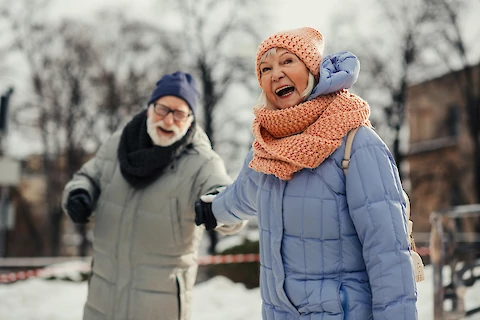
As winter rolls in, we all anticipate the beauty of falling snow, festive occasions, and cozying up in warm blankets. However, for seniors, the cold season brings unique challenges that demand special attention, including potential health risks and safety concerns. As caregivers, we play a pivotal role in ensuring that our senior loved ones navigate this season safely.
Winter Hazards for Seniors
Winter can be a risky time for seniors due to the unique set of potential hazards it brings. The cold temperatures can lead to hypothermia, both indoors and outdoors, if homes are not appropriately heated or if seniors are not dressed warmly. Seniors may also be at risk of falling due to icy surfaces, and the shorter daylight hours can lead to disorientation or increased anxiety.
Hypothermia is a real danger, particularly for seniors who may not feel the cold as much due to certain medications or health conditions. The decreased daylight can also affect seniors' circadian rhythms, causing sleep disturbances, confusion, and depression.
Home Safety Measures
Ensuring a warm and safe home environment is crucial to seniors' safety during winter. Encourage your loved one to set the thermostat to at least 68 to 70 degrees to prevent hypothermia and frostbite. At the same time, it's equally important to avoid fire hazards. Encourage them to have all heaters checked for proper functioning and ensure smoke and carbon monoxide detectors are working correctly.
Falls on icy surfaces are another common winter hazard. Regularly removing snow and ice from driveways, sidewalks, and steps can make a significant difference in preventing slips and falls. If necessary, enlist the help of a local snow removal service or a friendly neighbor to keep these areas safe.
Personal Safety Measures for Seniors
As much as we ensure home safety, personal measures are equally essential. Here are a few:
Dress Warmly
Dressing in layers is highly recommended during winter months. Starting with thermal underwear, then adding a light shirt or sweater, and finally topping it with a warm coat can help keep your loved one sufficiently warm when venturing outdoors.
Regular Visits to the Doctor
Chronic illnesses like diabetes, arthritis, or heart disease can worsen in colder weather. Hence, regular doctor appointments and consistent health check-ups should be ensured. Medication adjustments might also be required during this season.
Be Ready for Storms
Preparing for storm-related disruptions or emergencies is another key safety measure. Make sure your loved one is well-stocked on necessary supplies such as food, water, and medications and that they have a way to communicate with the outside world in case of a power outage.
Senior Helpers Southeastern Indiana Helps Keep Seniors Safe
Keeping our senior loved ones safe during winter requires careful planning, keen attention to their needs, and proactive steps to mitigate potential risks. Whether it's ensuring proper home heating, safe walkways, or addressing personal safety needs, such as the need for warm clothing and regular medical checks, our loved ones' winter safety should be our top priority.
If you live in New Albany, Madison, North Vernon, Jeffersonville, or Charlestown and require professional support in caring for your senior loved one, Senior Helpers Southeastern Indiana is here to help. Reach out to our team of highly-trained caregivers to ensure the safety and well-being of your senior loved one, not only during the winter months but all year round.